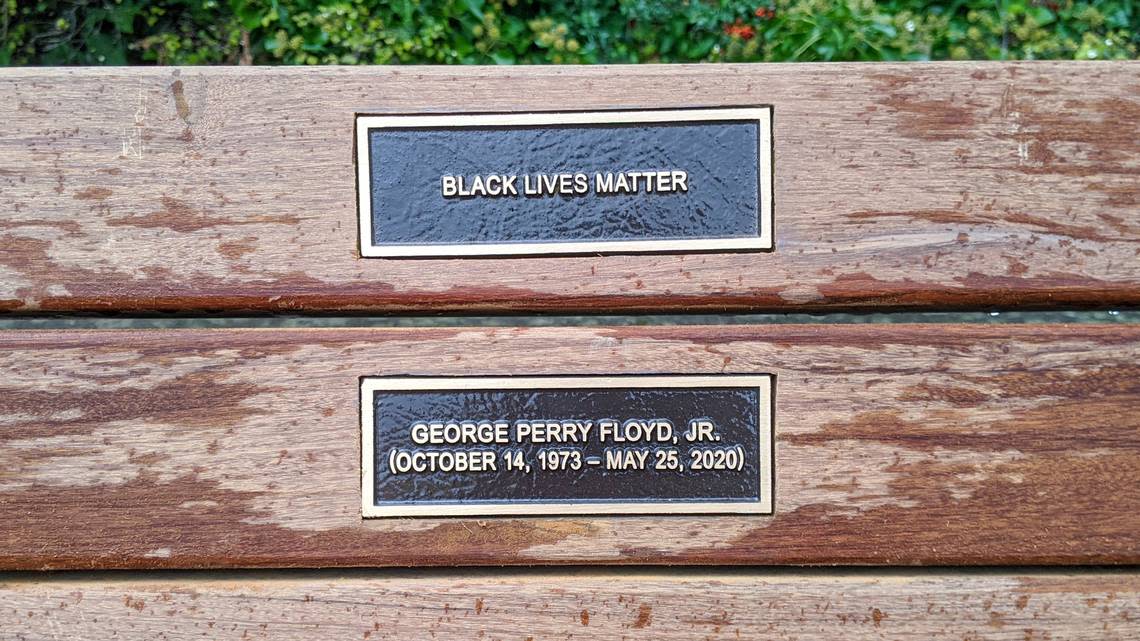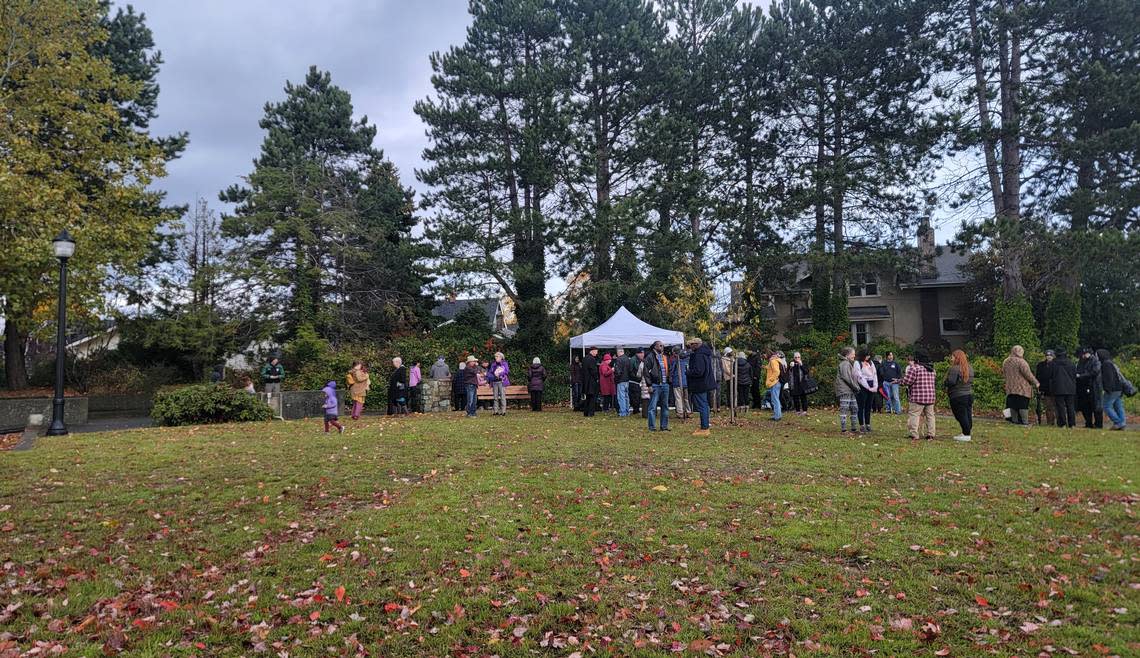Whatcom County has first permanent memorial dedicated to lives lost to systemic racism
Whatcom County now has its first permanent Black Lives Matter memorial at a Lettered Streets neighborhood park in Bellingham.
More than 100 people showed up to Fouts Park on Ellsworth Street on Sunday, Nov. 6, for the dedication of the memorial, that honors the lives of people of color lost to systematic racism.
The memorial includes a park bench, two plaques and a tree. The park bench is next to the children’s playground and sits facing the park and the tree.
The two bronze plaques in the middle of the bench read “Black Lives Matter” and “George Perry Floyd Jr., (Oct. 14, 1973 - May 25, 2020).”
The idea for the memorial was borne out of a collaboration between Kristina Michele Martens and the Bellingham Unitarian Fellowship.
Martens made history with Edwin “Skip” Williams as one of the first two Black members of the Bellingham City Council and has been a prominent figure in the local racial justice movement. She spoke earlier this year at the church’s Black Lives Matter ministry action team meeting and mentioned that nothing was happening to honor the second anniversary of George Floyd’s murder.
George Floyd, an unarmed Black man, died May 25, 2020, after a white Minneapolis police officer knelt on his neck for more than nine minutes. The former Minneapolis police officer, Derek Chauvin, was convicted of murdering Floyd and sentenced in June 2021 to 22½ years in prison.
Floyd’s murder sparked outrage and ignited civil rights protests worldwide. His death also led to police reform across the U.S., including in Washington state.
Naomi Gary from the Bellingham Unitarian Fellowship and Martens organized a dedication event in May on the second anniversary of Floyd’s murder. The May event also served as a kick-off to the fundraising campaign hosted by the Bellingham Unitarian Fellowship, which paid to install the memorial dedicated to the Black Lives Matter movement.
More than $2,000 was raised, Gary said in an interview with The Bellingham Herald. The bench was put in the park about a month ago, and the tree and plaques both went in this past week, Gary said.
“It’s a perfect chance to acknowledge both the history of injustice in our country, but also our goal. We’re not going to achieve it by putting up a bench, we’re not going to fix all the problems, but we’re going to recognize that there are problems. We’re going to recognize that we have to say the words Black Lives Matter … and that we need to say that as a culture and as a country, because we don’t act like that. We don’t act like they matter,” Gary said. “We’re continuing the process of acknowledging injustice and working toward justice.”
The tree is a Honey Locust and was picked by a city of Bellingham arborist, Gary said. The arborist chose that specific type of tree because it is native to several of the places Floyd lived throughout his life, and grows in both Minneapolis and the Pacific Northwest, she said.
The bench, which faces the tree and the park, is designed to be a contemplative space, Gary said.

Feeling included
The dedication ceremony on Sunday started with a church service at the Bellingham Unitarian Fellowship that focused on the Black Lives Matter movement before community members gathered at Fouts Park.
In addition to Martens, two Whatcom Intergenerational High School students, Isaac Gammons-Reese and Winter Bee spoke and sang.
Gammons-Reese, who is Black, said having the permanent memorial is important and creates a space for white people to realize how poorly people of color have been treated. He said he hopes white community members realize not just the overt racism, but the microaggressions Black, Indigenous and people of color people also experience. He said there’s a “striking loneliness” that comes from experiencing microaggressions.
While systemic change isn’t happening fast enough, Gammons-Reese, 17, said it’s important to realize the amount of growth made in the racial justice movement over the past two years. After Floyd’s murder, Gammons-Reese said he’s noticed his white counterparts are listening more to what he has to say about his lived experiences — something he said was reflected in the number of people that came to the memorial dedication.
“I want people to know that it’s on everybody to make minorities feel included, and that feeling of loneliness can stop if we allow BIPOC people to have their spaces, while also including them in our spaces. I feel like everybody deserves the chance to fit in and we can argue about what that looks like, but acknowledging the fact that BIPOC people have been seen as outsiders for so long, is the first step to realizing how we can include them in our daily life,” he said.
Shovia Muchirawehondo, who shared some words with the crowd at the event, said she attended Sunday because people of color’s lives are on the line. She said the park is a place where life is simple and the memorial provides a reminder to people that life is not as simple for everyone.
Muchirawehondo, who is African American, said it’s especially important to have a permanent memorial dedicated to the Black Lives Matter movement because it’s easy to forget the everyday racism and experiences people of color face living in a predominantly white community. She said by standing together, people can work toward ending the divides racism causes.
Muchirawehondo said the memorial signifies that Bellingham and Whatcom County realize what is happening nationwide, how these issues impact the community in the long run, and that people are committed to tackling and dismantling racism.

Always remember
For her part, Martens said the permanent memorial was a way to take a step toward normalizing having conversations about racism and race relations in America.
She said the memorial has created a space where people can communicate with one another and understand where each side is coming from, while also taking action.
“At least right there in Fouts Park we will remember, always. And hopefully, it will encourage us as a community to make it better, to find solutions, to continue to learn from each other and hopefully one day, honestly, put all of the divisiveness behind us,” Martens said.
Martens said it’s important for people who are less affected by systemic and systematic racism to get involved and that it can’t exclusively be up to people of color to work toward ending it. She said it’s also important that people pass down their expertise and mentor youth so that the work being done now continues into the future.
“Now we’re going to create new reasons to remember what a great community this is, where we are acknowledging the past, accepting it, but also saying that we’re not just going to live there. We’re going to move forward and we’re going to celebrate diversity and have these actual physical acknowledgments of milestones for where the community was and how it’s changing,” she said.
Martens said Floyd’s murder was an event that changed the nation, and she sees the memorial as a way to continue the conversation for future generations.
“Obviously the impact wanes for generations that weren’t there, but having a memorial makes them think about it. And as kids continue to play in that park, hopefully they’ll ask whoever their parent is, ‘Who was George Floyd? Why is that important?’ and that’s really the part of the conversation that I never wanted to die,” Martens said. “We have built a memorial so that we don’t forget.”
